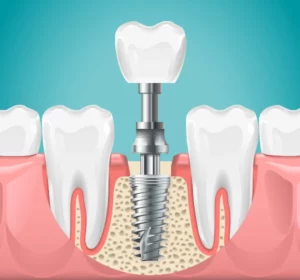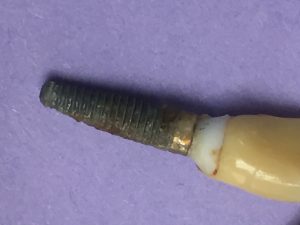
If you’re wondering ‘how long do dental implants last?’, you’re likely seeking a straightforward answer without sifting through medical jargon. Generally, dental implants offer a potential lifetime of use for the titanium post, while the crown may need replacing after 10 to 25 years. This article will explore the factors that affect this variability and provide actionable advice to prolong the life of your implants.
Key Takeaways
- The titanium post of a dental implant can potentially last a lifetime, but the crown often requires replacement after 10-25 years, with average implant longevity being around 25 years.
- Factors determining the lifespan of dental implants include material composition, the patient’s systemic health and oral hygiene, with practices like regular brushing, flossing, and dental checkups being essential for longevity.
- Advancements in technology such as 3D printing and potential innovations like implant sensors are improving the success and durability of dental implants, while personalized care and choosing the right implant dentist are crucial for optimal outcomes.
Dental Implant Composition and Longevity
Dental implants, often heralded as a revolution in restorative dentistry, are composed of three major components: a titanium post, an abutment, and a crown or prosthesis. Titanium, known for its strength and compatibility with the human body, is the material of choice for the implant post. You may wonder about the longevity of this titanium post. The answer might surprise you – under ideal conditions, it can endure a lifetime!
However, the crown or prosthesis on top may need replacement after a decade or a decade and a half due to normal wear.
Unveiling the Lifespan of Dental Implants
While the titanium post of a dental implant can potentially last a lifetime, the overall lifespan of the implant, including the crown, differs. Most dental implants have an average lifespan of around 25 years, and some sources even suggest a permanent lifespan. Fascinating, isn’t it?
Research indicates that with proper management and care, dental implants, including long dental implants, can endure up to thirty years under ideal conditions, serving some patients for their entire life. Many people often wonder, “how long dental implants last?” and the answer largely depends on the individual’s oral hygiene and overall health.
Factors That Influence Implant Longevity
The longevity of dental implants, capable of lasting for decades, is influenced by several factors. The material of the implant, for instance, plays a significant role. Zirconia implants, known for their resistance to bacterial attachment, may offer a lower risk of peri-implant infection, thereby contributing to implant longevity.
But that’s not all. A patient’s systemic health, including gum disease, can also impact dental implant longevity. For instance, conditions such as diabetes or a compromised immune system can detrimentally affect dental implant longevity, necessitating careful management and personalized treatment plans.
The Role of Dental Hygiene in Implant Longevity
Poor oral hygiene can result in bacteria accumulation, inflammation, and infection around dental implants, escalating the risk of implant failure. Hence, good dental hygiene is a key factor in preserving your dental implants’ longevity. This includes practices like brushing twice a day, flossing regularly, and controlling plaque and bacteria buildup.
After all, your dental implants, including mini dental implants, deserve the same care and attention as your natural teeth, especially when addressing the issue of missing teeth!
Identifying Signs of Dental Implant Failure
Despite our best efforts, not every dental implant journey is a smooth ride. There are signs that you need to be aware of, signs that could indicate potential dental implant failure. These could range from mechanical damages like microcracks in zirconia abutments and cracked crowns to more serious issues like infections.
Another red flag to look out for is loose implants. If your implant moves when touched or if you have difficulty chewing or biting, it’s a clear sign that there’s a problem that needs immediate attention, such as teeth grinding.
Comparing Dental Implants with Other Tooth Replacement Options
When it comes to tooth replacement options, dental implants are often compared with dental bridges and dentures. But how do they stack up? Well, dental implants certainly have a few aces up their sleeve. For starters, unlike bridges, they don’t require the reduction of neighboring teeth’s enamel, which helps preserve the health of adjacent teeth.
Furthermore, compared to dentures, implants offer superior comfort and better chewing efficiency. And let’s not forget the aesthetic appeal of zirconia implants. Their tooth-like color makes them a great choice for patients with metal sensitivities or aesthetic preferences.
Maintenance: Ensuring Your Dental Implants Last
The longevity of your dental implants is not solely reliant on selecting an appropriate dentist and implant. It also necessitates adherence to a daily routine involving brushing at least twice with a soft-bristle brush and low-abrasive toothpaste, along with regular flossing to clean between the teeth and abutments. Additionally, choosing dental implants in Rockville can provide you with a durable solution that can last a lifetime when properly cared for.
Additionally, professional dental care is crucial for the longevity of dental implants. Regular checkups and cleanings are recommended to examine implants for wear or damage, and patients should visit their dentist every four to six months.
Impact of Technological Advances on Dental Implant Longevity
As we journey further into the 21st century, dental implant technology continues to reshape the field of dental implantology, contributing to improved implant success and durability. 3D printing technology, for instance, allows for the creation of custom-fitted dental implants that enhance comfort and reduce recovery time.
But it doesn’t stop there. Imagine having dental implants with built-in sensors that offer real-time health monitoring, facilitating early detection and intervention for complications! It’s not a scene from a sci-fi movie, but a reality that’s gaining traction in the field of implantology.
Choosing the Right Implant Dentist for Optimal Outcomes

Selecting a suitable implant dentist significantly contributes to a successful dental implant procedure. A skilled dentist with advanced training and a substantial track record in implant placement is paramount for superior outcomes. But how do you know if a dentist is the right fit for you? Let’s delve deeper into the qualifications and expertise that you should look for, and why patient testimonials and success rates matter.
Qualifications and Expertise
Expertise and qualifications hold significance in the realm of dental implant surgery. A dentist with advanced training and a substantial track record in implant placement can make a world of difference in the success of your dental implant. It’s also crucial that the dentist is able to deliver the specific results you want, which includes the brand, size, and placement of the implants.
Patient Testimonials and Success Rates
Valuable insights into a dentist’s competence in delivering successful dental implants can be gleaned from patient testimonials and success rates. Reviews and testimonials from previous patients provide a glimpse into their actual experiences and satisfaction levels.
In addition to this, asking about a dentist’s dental implant success rate during the consultation can provide insight into their track record.
Addressing Bone Health for Dental Implant Success

Successful dental implant placement depends on more than just the implant; the health of your jawbone is also a critical factor. Adequate bone density is vital for implant stability and successful osseointegration. Dental professionals employ methods like visual exams, X-rays, and CT scans to evaluate jawbone density before implantation.
But what if your jawbone density is inadequate? Fear not, as bone grafts can enhance or rebuild the jawbone to support dental implants.
Personalized Care for Individual Needs
Given the uniqueness of each patient and their dental implant needs, personalized care holds paramount importance. A patient’s personalized dental implant care accounts for their unique lifestyle, eating habits, and general health, which are crucial determinants of the implant’s longevity.
Moreover, aesthetic preferences, such as the desired color and shape of prosthetic teeth, are also considered to ensure the dental implant matches their natural teeth.
Summary
From the composition and longevity of dental implants to the factors influencing their lifespan, we’ve covered a lot of ground in this comprehensive guide. We’ve also delved into the role of dental hygiene, how to identify implant failure, and how dental implants compare with other tooth replacement options. The importance of maintenance, technological advancements, and choosing the right dentist also took center stage. And let’s not forget about addressing bone health and the importance of personalized care.
Frequently Asked Questions
What is the downside of dental implants?
The downside of dental implants includes the risks of infection, damage to other teeth, delayed bone healing, nerve damage, and prolonged bleeding. Consider these factors before opting for dental implants.
How often do teeth implants need to be replaced?
Teeth implants generally need to be replaced every 25 years if properly cared for, which is much longer than bridges and dentures that last an average of 10 years.
Will dental implants last a lifetime?
Dental implants are designed to last a lifetime, but they require proper care to prevent decay and gum disease. While the average lifespan is 10-30 years, they have the potential to last for the rest of your life.
What happens after 25 years of dental implant?
With proper care, dental implants can last a lifetime but may require crown replacement due to damage. The implant root fuses with the jawbone and can become loose or decay over time.
How long do dental implants last?
Dental implants typically last an average of 25 years, but with proper care, they can last up to 30 years or even a lifetime.





